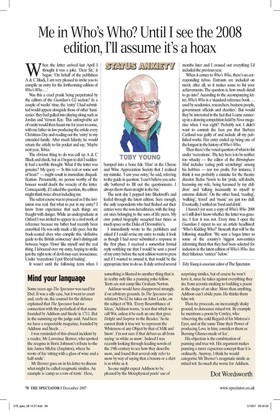Mind your language
Some years ago The Spectator was sued for libel. It was a silly case, but it went to court and, early on, the counsel for the defence explained that The Spectator had no connection with the periodical of that name founded by Addison and Steele in 1711. But in the summing up the judge said, 'And here we have a respectable magazine, founded by Addison and Steele.
I was reminded of this absurd incident by a reader, Mr Lawrence Brewer, who spotted the zeugma in Boris Johnson's tribute to the late James Michie (Jaspistos), where he wrote of his 'sitting with a glass of wine and a half-smile'.
Mr Brewer goes on in his letter to discuss what might be called zeugmatic similes. An example is 'camp as a row of tents'. Here, something is likened to another thing that is in reality only like a punning yoke-fellow. Tents are not camp like Graham Norton.
Addison would have disapproved strongly, if on arbitrary grounds. In The Spectator (no relation) No 62 he takes on John Locke, on the subject of Wit. 'Every Resemblance of Ideas,' Addison warns, Is not that which we call Wit, unless it be such an one that gives Delight and Stuptize to the Reader.' So he cannot think it true wit `to represent the Whiteness of any Object by that of Milk and Snow'. I'm not sure if that debars us all from saying 'as white as snow'. Indeed I was recently looking through leading novels of the 19th century to see how they describe snow, and found that several only refer to snow by way of saying that a bosom or a shirt is as white as it.
So one might expect Addison to be pleased by the Metaphysical poets' use of surprising similes, but of course he won't have it, since he takes against everything they do, from acrostic-making to building a poem in the shape of an altar. More than anything, Addison can't abide puns. He thinks them false wit.
Then he proceeds, on increasingly shaky ground, to denounce mixed wit. By example he mentions a poem by Cowley, who 'observing the cold Regard of his Mistress's Eyes, and at the same Time their Power of producing Love in him, considers them as Burning-Glasses made of Ice'.
His objection is the combination of punning and true wit. His argument makes punning a more capacious concept than it is ordinarily. Anyway, I think he would categorise Mr Brewer's zeugmatic simile as mixed wit. So much the worse for Addison.
Dot Wordsworth

























































 Previous page
Previous page